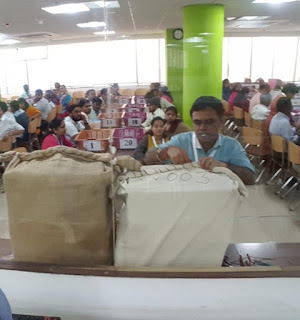*1. What is Pradhan Mantri Garib Kalyan Deposit Scheme (PMGKDS), 2016?*
Pradhan Mantri Garib Kalyan Deposit Scheme (PMGKDS), 2016 is a scheme notified by the Government of India on December 16, 2016 which is applicable to every declarant under the Taxation and Investment Regime for Pradhan Mantri Garib Kalyan Yojana, 2016.
*2. Who is eligible to deposit in PMGKS?*
The deposit under this Scheme shall be made by any person who declared undisclosed income under sub-section (1) of section 199C of the Taxation and Investment Regime for Pradhan Mantri Garib Kalyan Yojana, 2016.
*3. In what form will the deposits under this scheme be held?*
The Deposits shall be held at the credit of the declarant in Bond Ledger Accounts (BLA) maintained with Reserve Bank of India.
*4. Who are the authorized agencies where the application and amount of deposit will be accepted?*
Application and amount for the deposit (in the form of Bond Ledger Account) shall be received by any banking company to which the Banking Regulation Act, 1949 (10 of 1949) applies (Authorized Banks).
*5. Where can declarants get the application form?*
Application for the deposit will be available at branches of authorized banks. It is also available in the Reserve Bank of India website.
*6. When can a declarant make the deposit into the scheme?*
The deposits under this Scheme shall be made in a single payment in any of the authorized banks from the 17th day of December, 2016 till 31st day of March, 2017
*7. What are the Know-Your-Customer (KYC) norms?*
Permanent Account Number (PAN) is the KYC document for individuals depositing in the scheme. If a declarant does not hold PAN, he shall apply for PAN and provide the details of such PAN application along with acknowledgement number to the bank while making the application. On receipt of PAN, the details may be updated with the bank from which application was made.
*8. What is the minimum and maximum limit for depositing in the scheme?*
The deposit by a declarant shall not be less than twenty-five per cent of the undisclosed income declared under sub-section (1) of section 199C of the Taxation and Investment Regime for Pradhan Mantri Garib Kalyan Yojana, 2016. Deposit shall be made in multiples of ₹ 100.
*9. Will any interest be paid on the deposit under the scheme?*
No interest shall be paid for deposits made in this scheme.
*10. After making the deposit, will any documentary evidence be issued?*
On deposit, an acknowledgement receipt mentioning name of declarant and amount deposited will be duly authorized and provided by the bank from which application was made. Subsequently a certificate of holding for the BLA will be issued which may be collected from the authorized bank.
*11. When will the deposit be repaid?*
Repayment of the deposit will be made after a period of 4 years from the effective date of deposit (ie., date of tender of cash or the date of realization of draft or cheque or transfer through electronic transfer)
*12. What will the declarant get on redemption?*
On redemption, the entire amount deposited into the scheme will be repaid.
*13. How will the declarant get the redemption amount?*
The redemption amount will be credited to the bank account furnished by the person in the application form.
*14. What are the procedures involved during redemption?*
On the date of maturity, the proceeds will be credited to the bank account as per the details on record.
In case there are changes in any details, such as, account number, IFSC code, email ids etc then the investor must intimate Reserve Bank Of India , through the authorized banks promptly.
*15. Can the deposit made into this scheme be prematurely redeemed ?*
No, option for premature redemption of the BLA is not available.
*16. Can the BLA be gifted/transferred to a relative or friend on some occasion?*
No, the BLAs cannot be gifted/transferred to any relative or friend. Transferability of the Bond Ledger Account shall be limited to nominee or to the legal heir of an individual holder, only in the event of death of the declarant.
*17. Who will provide other services to the declarants after deposit in the scheme?*
The banks through which the deposit into this scheme was made will provide other customer services such as change of bank account details, cancellation of nominee etc.
*18. What are the payment options for depositing in PMGKS?*
The deposit shall be made in the form of cash or draft or cheque drawn in favour of the authorised bank accepting such deposit or by electronic transfer.
*19. Whether nomination facility is available for these investments?*
Yes, nomination facility is available as per the provisions of the Government Securities Act 2006 and Government Securities Regulations, 2007. A nomination form is available along with Application form. In case of cancellation/change in nomination, a separate form is to be filled and submitted to the authorized bank.
*20. Are the BLAs tradable?*
No, the Bonds ledger Account are not tradable.




